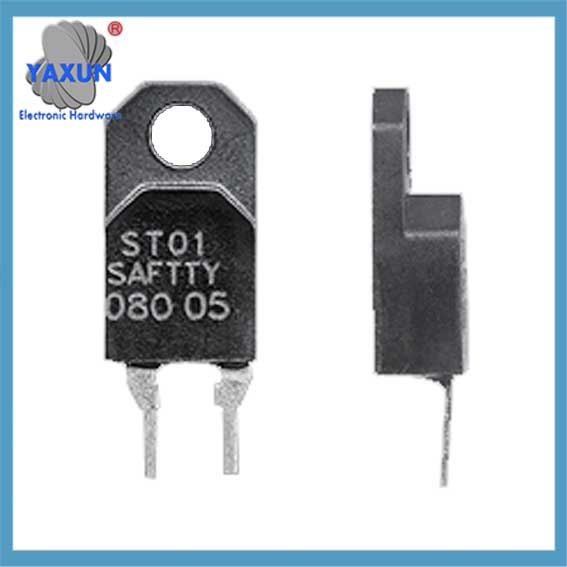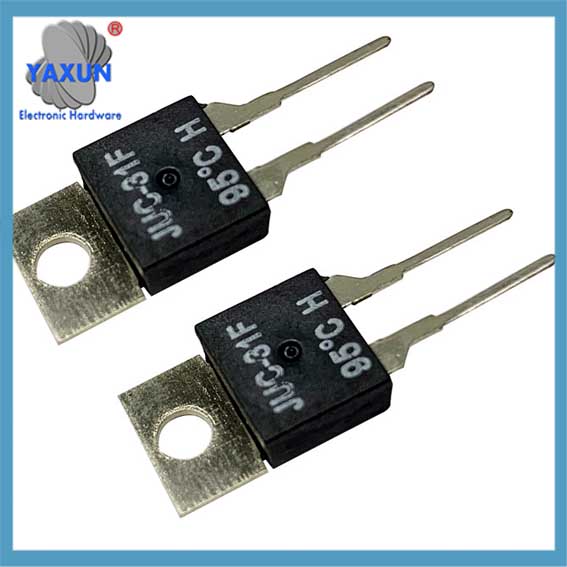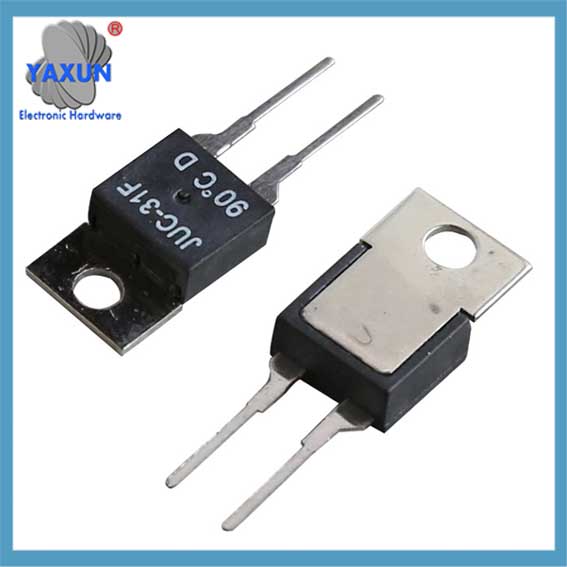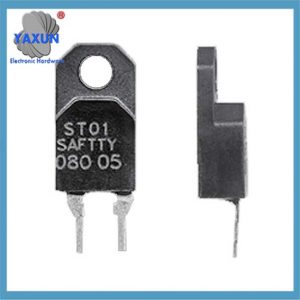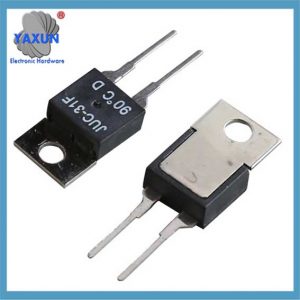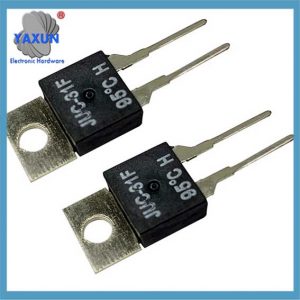Kategorie produktów
- bezpiecznik termiczny 32
- bezpieczniki do montażu powierzchniowego 12
- termistor 36
- Uchwyt bezpiecznika do montażu na płytce drukowanej 27
- Wiązka przewodów 6
- Uchwyty bezpieczników ostrza 17
- termostat 50
- Bezpiecznik elektryczny 24
- Motorowy czujnik temperatury 7
- Wyłącznik termiczny 22
- Uchwyt skrzynki bezpieczników 36
- Czujnik temperatury 75
- Wyłącznik termiczny 68
- Bezpiecznik samochodowy 20
- Przykręcić bezpieczniki 8
Tagi produktów
Dysk PCB-U-220 PCB Mały termostat ochrony termicznej
JUC 31F / Seria ST01 B U8 TO-220 PCB-BIMETAL DISC TERMOSTAT: Snap Action Spst Bimetalic Thermostat, który spełnia standardy Rohs.
JUC 31F / ST01 B U8, 6700 Termostat subminiature serii to-220: Termostat dysk bimetalu podwodnego z odpornością kontaktową 50 Milliohms Max. Ma możliwość przełącznika 2 wzmacniacz dla 48 VDC lub 120 VAC dla 30,000 cykle.
Termostat ochrony PCB-Thermal PCB to metoda, która wykrywa wysokie temperatury i odłącza moc obwodów elektronicznych, aby zapobiec uszkodzeniom lub pożarom. A TO-220 PCB- Termostat ochrony termicznych jest często używany w silnikach, aby zapobiec przegrzaniu i pożarom poprzez wyłączenie energii elektrycznej, gdy ciepło silnika wzrośnie zbyt wysokie. Ochrony termiczne są zwykle umieszczane w silniku.
Termostat płytek PCB-U-220 to przełącznik uruchamiany termicznie, który wykorzystuje dysk bimetaliczny do wyczuwania temperatury i otwierania lub zamykania obwodu elektrycznego. Gdy dysk jest narażony na określoną temperaturę, pęka i albo łamie lub uzupełnia obwód. Oto kilka przykładów termostatów płyt-purzuckich do 220:
JUC 31F / Seria ST01 B U8 TO-220 PCB-BIMETAL DISC TERMOSTAT: Snap Action Spst Bimetalic Thermostat, który spełnia standardy Rohs.
JUC 31F / ST01 B U8, 6700 Termostat subminiature serii to-220: Termostat dysk bimetalu podwodnego z odpornością kontaktową 50 Milliohms Max. Ma możliwość przełącznika 2 wzmacniacz dla 48 VDC lub 120 VAC dla 30,000 cykle.
JUC 31F / ST01 B U8, 802 Termostat PCB serii: Miniaturowy termostat Bimetal, który jest zgodny z międzynarodowym pakietem Y220/TO220.
Struktura połączenia termostatu PCB-Bimetal
STAtyczny kontakt i pokrywa ceramiczna są nitowane; Ruchomy kontakt jest przyspawany do trzciny, który jest w kształcie krzyża, a jego cztery nogi są podłączone do dna skorupy; Wewnętrzna otwór bimetalicznego paska przechodzi przez ruchomy kontakt i jest umieszczany na trzcinie. Bieżący przechodzi przez statyczny kontakt do ruchomego kontakt, a następnie łączy się ze skorupą przez trzcinę, aby utworzyć pętlę.
ST01 B U8 PCB-Bimetal Zasada pracy
Gdy obwód jest w normalnym stanie, Kontakt ruchomy jest w bliskim kontakcie z kontaktem statycznym pod wstępnym ciśnieniem trzciny. Gdy temperatura osiągnie temperaturę roboczą, Bimetaliczny pasek jest zdeformowany przez ciepło i szybko odwraca, naciskając Reed, aby zejść w dół, powodując oddzielenie kontaktów i odcięcie obwodu. Po odcięciu obwodu, Temperatura zaczyna spadać. Gdy temperatura spadnie do temperatury resetowania, Bimetaliczny pas powraca do swojego stanu początkowego, a Reed również odbija się na swoim stanie początkowym. Ruch ruchomego i ponowne kontakt kontaktowy, a obwód powraca do normalnego stanu przewodnictwa.
Parametr produktu
Nominalna temperatura przełączania (Nst) w 5 ° C. : 60 °C – 180 °C
Tolerancja (standard) : ± 5k
Temperatura przełącznika odwrotnego (RST) tolerancja :
≥ 35 °C (≤ 80 ° C nst)
-30K ± 15k (≥ 85 ° C ≤ 180 ° C nst)
Grubość : 5.6mm
Średnica : 9.8mm
Długość czapki izolacyjnej : 18.3mm
Odporność na impregnację : odpowiedni
Nadaje się do instalacji w klasie ochrony : I+ll
Odporność na ciśnienie na obudowę przełącznika : 300N
Standardowe połączenie : 0.33 mm² / AWG22
Napięcie izolacji : 1.5 kv
Zakres napięcia roboczego AC/DC : aż do 500 VAC / 14 W DC
Znamione napięcie AC : 250 V(VDE), 277 V(ul)
Znamionowy prąd AC cos ϕ = 1.0 /cykle :2.5A / 10,000
Maks. Przełączanie prądu AC cos ϕ = 1.0 /cykle : 6.3 A / 3,000/ 7.5 A / 300
Znamionowy prąd AC cos ϕ = 0.6 /cykle : 1.6 A / 10,000
Znamione napięcie DC : 12.0 V
Maks. Przełączanie prądu DC /cykli : 40.0 A / 5,000
Całkowity czas odbicia : < 1 SM
Odporność na kontakt : ≤ 50 mΩ
Odporność na wibracje w 10 … 60 Hz :100 m/s²
Dostępne zatwierdzenia : UL/TUV/CQC/CB
Skontaktuj się z nami
Czekam na Twój e-mail, odpowiemy Ci w ciągu 12 godziny z cennymi informacjami, których potrzebujesz.
 English
English Afrikaans
Afrikaans العربية
العربية বাংলা
বাংলা bosanski jezik
bosanski jezik Български
Български Català
Català 粤语
粤语 中文(简体)
中文(简体) 中文(漢字)
中文(漢字) Hrvatski
Hrvatski Čeština
Čeština Nederlands
Nederlands Eesti keel
Eesti keel Suomi
Suomi Français
Français Deutsch
Deutsch Ελληνικά
Ελληνικά हिन्दी; हिंदी
हिन्दी; हिंदी Magyar
Magyar Bahasa Indonesia
Bahasa Indonesia Italiano
Italiano 日本語
日本語 한국어
한국어 Latviešu valoda
Latviešu valoda Lietuvių kalba
Lietuvių kalba македонски јазик
македонски јазик Bahasa Melayu
Bahasa Melayu Norsk
Norsk پارسی
پارسی Polski
Polski Português
Português Română
Română Русский
Русский Cрпски језик
Cрпски језик Slovenčina
Slovenčina Slovenščina
Slovenščina Español
Español Svenska
Svenska ภาษาไทย
ภาษาไทย Türkçe
Türkçe Українська
Українська اردو
اردو Tiếng Việt
Tiếng Việt
